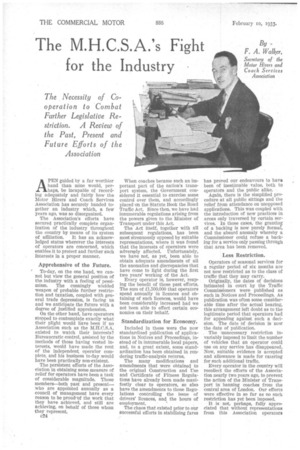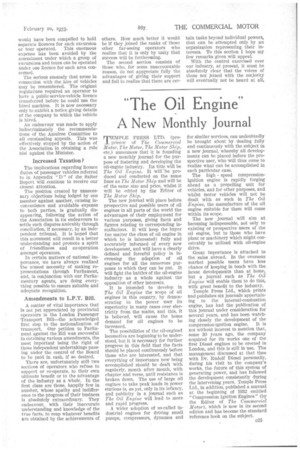The M.H.C.S.A.'s Fight for the Industry
Page 74

Page 75

If you've noticed an error in this article please click here to report it so we can fix it.
APEN guided by a far worthier hand than mine would, perhaps, be incapable of recording adequately and fairly how the Motor Hirers and Coach Services Association has securely banded together an industry which, a few years ago, was so disorganized.
The Association's efforts have secured practically complete organization of the industry throughout the country by means of its system
of affiliation. It has an acknowledged status wherever the interests of operators are concerned, which enables it to protect and further such interests in a proper manner.
Apprehensive of the Future.
' To-day, on the one hand, we cannot but view the general position of the industry with a feeling of pessimism. The cunningly wielded weapon of probable further restriction and taxation, coupled with general trade depression, is facing us and we anticipate the future with a degree of justified apprehension.
On the other hand, have operators stopped to contemplate exactly what their plight would have been if no Association such as the M.H.C.S.A. existed to watch their interests? Bureaucratic control, assisted by the methods of those having vested interests, would have made the rout of the independent operator complete, and his business to-day would have been practically non-existent.
The persistent efforts of the Association in obtaining some measure of relief for operators have been a task of considerable magnitude. Those members—both past and present— who are appointed annually as a council of management have every reason to be proud-of the work that they have achieved, and still are achieving, on behalf of those whom they represent.
024
When coaches became such an important part of the nation's transport system, the Government considered it essential to exercise some control over them, and accordingly placed on the Statute Book the Road Traffic Act. Since then, we have had innumerable regulations arising from the powers given to the Minister of Transport under this Act.
The Act itself, together with all subsequent regulations, has been most strenuously opposed by suitable representations, where it was found that the interests of operators were adversely affected. Unfortunately, we have not, as yet, been able to obtain adequate amendments of all the anomalies and discrepancies that have come to light during the first two years' working of the Act.
Every operator is, however, reaping the benefit of those past efforts. The sum of £1,500,000 that operators spend annually in licences and obtaining of such licences, would have been considerably increased had we not been able to effect certain economies on their behalf.
Standardization for Economy.
Included in these were the now standardized publication of applications in Notices and Proceedings, instead of in innumerable local papers, and, to a great extent, some standardization has been obtained in rendering traffic-analysis returns.
The many modifications and amendments that were obtained to the original Construction and Use and Certificate of Fitness Regulations have already been made manifestly clear to operators, so also have the amendments to those Regulations controlling the issue of drivers' licences, and the hours of employment.
The chaos that existed prior to our successful efforts in stabilizing fares
has proved our endeavours to have been of inestimable value, both to operators and the public alike.
Again, there is the simplified procedure at all public sittings and the relief from attendance on unopposed applications. This was coupled with the introduction of new practices in areas only traversed by certain services. In those cases, the granting of a backing is now purely format, and the absurd anomaly whereby a Commissioner could refuse a backing for a service only passing through that area has been removed.
Less Restriction.
Operators of seasonal services for a regular period of six months are not now restricted as to the class of traffic that they may carry.
Originally, the dates of decisions intimated in court by the Traffic Commissioners were published as such in Notices and Proceedings. As publication was often some considerable time after the actual hearing, this arrangement left doubt as to the legitimate period that operators had for appealing against such a decision. The date of decision is now the date of publication.
The unnecessary restriction invariably imposed to limit the number of vehicles that an operator could use on any service has disappeared. Now, suitable evidence is accepted and allowance is made for catering for such additional traffic.
Every operator in the country will recollect the efforts of the Association nearly two years ago, to prevent the action of the Minister of Transport in banning coaches from the central area of London. Our efforts were effective in so far as no such restriction has yet been Imposed.
It is not, perhaps, fully appreciated that without representations from this Association operators would have been compelled to hold separate licences for each excursion or tour operated. This enormous expense has been avoided by the amendment under which a group of excursions and tours can be operated under one licence for each area concerned.
The serious anomaly that arose in connection with the hire of vehicles may be remembered. The original regulations required an operator to have a public-service-vehicle licence transferred before he could use the hired machine. It is now necessary only to exhibit a notice giving details of the company to which the vehicle is hired.
An endeavour was made to apply indiscriminately the recommendations of the Amulree Committee to all outstanding appeals. This was effectively stopped by the action of the Association in obtaining a rule nisi against the Minister.
Increased Taxation ?
The implications regarding licence duties of passenger vehicles referred to in Appendix " D " of the Salter Report will continue to receive our closest attention.
The position created by unnecessary objections being lodged by one member against another, causing inconvenience and avoidable expense to both parties, is gradually disappearing, following the action of the Association in its endeavours to settle such disputes amicably through conciliation, if necessary, by an independent tribunal. It is hoped that this movement will result in a better understanding and promote a spirit of friendliness and co-operation amongst operators.
In certain matters of national importance, we have always realized the utmost necessity of making representations through Parliament, and, in conjunction with our Parliamentary agents, are doing everything possible to ensure suitable and adequate recognition.
Amendments to L.P.T. Bill.
A matter of vital importance that Is not yet appreciated by provincial operators is the London Passenger Transport Bill—the acknowledged first step to the nationalization of transport. Our petition to Parliament against the Bill was successful in obtaining various amendments, the most important being the right of those independent undertakings passing under the control of the Board to be paid in cash, if so desired.
There are, unfortunately still two sections of operators who refuse to support or co-operate, to their own ultimate benefit or to the advantage of the industry as a whole. In the first class are those, happily few in number, whose apathy and Indifference to the progress of their business is absolutely extraordinary. They endeavour, with their inaccurate understanding and knowledge of the true facts, to reap whatever benefits are obtained by the achievements of others. How much better it would be if they joined the ranks of those other far-seeing operators who realize that it is only by unity that success will be forthcoming.
The second section consists of those who, for some unaccountable reason, do not appreciate fully the advantages of giving their support and fail to realize that there are cer tain tasks beyond individual powers, that can be attempted only by an organization representing their interests. To this section I hope my few remarks given will appeal.
With the control exercised over our industry, at present, it must be absolutely clear that the voices of those not joined with the majority will eventually not be heard at all.




































































































































































